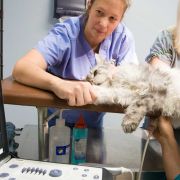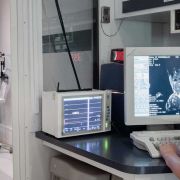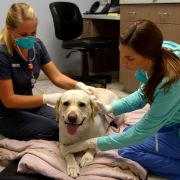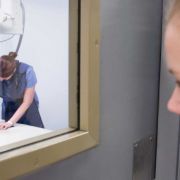Date:
By Gavin Olsen
“Preventive medicine,” a term that most people find synonymous with vaccination, involves much more. Of course, vaccination is a large aspect of preventive medicine, but physical examination, routine lab work and other types of disease prevention are included.
There are numerous vaccines on the market and not all are required. According to a joint publication by the American Veterinary Medical Association and American Animal Hospital Association, which groups vaccines according to whether they are core (or highly recommended) or non-core (considered elective, unless the diseases are endemic in the area), dogs should receive four core vaccines, while cats should receive between four and five.
Dogs should be vaccinated for rabies vaccine, distemper virus, parvovirus and adenovirus (an infection that can result in severe liver disease). Other vaccinations that are administered to some dogs include leptospirosis, Bordetella (commonly known as “kennel cough”), Lyme disease, Canine Influenza Virus and others. Cats should be vaccinated for leukemia virus, rabies virus, panleukopenia virus, calicivirus and herpesvirus. Because rabies virus poses a potential human health risk, state law mandates the rabies vaccine. Feline leukemia virus is considered by some to be an elective vaccine because it has been linked to development of vaccine-associated sarcoma in some studies. Notice that these vaccinations are for viral diseases, as there is no specific treatment that has proven to be beneficial for viral diseases and prevention is the best way to keep your pet healthy. Frequency of vaccination is different depending on the vaccines utilized, age of the pet and risk of exposure and should be discussed with your veterinarian, along with use of non-core vaccines.
Preventive medicine also includes annual examinations. It is recommended to have your pet examined at least once a year and often twice a year. At each of these examinations, heartworm testing or lab work may be recommended to detect organ dysfunction (hopefully) before it becomes severe. Additionally, at the examination, a thorough physical examination should be performed. During this examination, abnormal masses, lesions on the skin or eyes and evaluation for dental disease can be completed. Dental tartar can be extremely damaging locally, causing gingivitis, pain, infection, tooth root abscesses and decreased ability to eat. Severe dental disease has also been theorized to result in abnormalities and possible infections in other organs, including the heart and kidneys. Finally, any masses that are noted may need to be investigated by sampling the cells or tissue that composes the mass.
The last aspect of preventive medicine includes the prevention of heartworm disease. Heartworms are transmitted to both cats and dogs via mosquitoes. After testing by your veterinarian, preventive medication should be administered either monthly or every six months (via an injectable medication). Heartworms can be damaging not only to the heart but also to the lungs, the kidneys and other organs. The American Heartworm Society has identified heartworm disease in all 50 states: Here in the Southeast, heartworm disease is endemic. Treatment recommendation is that all pets receive heartworm prophylaxis year-round. Most people do not think that cats can get heartworms, especially indoor cats. However, this is possible because — as most of us can attest — mosquitoes do not ask politely to come into our houses and can therefore spread diseases even to indoor-only animals. There are many different heartworm preventive medications available and some include ingredients that can be toxic to cats, so please discuss treatment and testing with your veterinarian.
Hopefully, the importance of preventive medicine has been adequately conveyed so that our furry, four-legged family members can remain as healthy as possible.


















